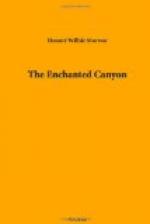“I kept them down pretty well, I think,” said Abbott, with justifiable pride, as he picked up the telephone. After several moments he reported that the President would see Enoch at five o’clock.
“Very well,” Enoch nodded. “Then you’d better tell me the things I need to know.”
Abbott went into the outer office for his note book and, returning with it, for an hour he reported to Enoch on the business of the Department. Enoch, puffing on a cigar, asked questions and made notes himself. When Charley had finished, he said:
“Thank you, Abbott! I don’t see but what I could have remained away indefinitely. Matters seem in excellent shape.”
“Not everything, Mr. Secretary. Your oil bill has been unaccountably blocked in the Senate. The intervention in Mexico talk has begun again. The Geological Survey is in a mix-up and it looks as if a scandal were about to burst on poor old Cheney’s head. I’m afraid he’s outlived his usefulness anyhow. The newspapers in California are starting a new states-rights campaign for water power control and, every day since I’ve returned, Secretary Fowler’s office has called and asked for the date of your return.”
“Interested in me, aren’t they!” smiled Enoch. “Why is the President in such a hurry to see me, Abbott?”
“I don’t know, sir. I promised his secretary that the moment I heard from you I’d send such a message as I did send you.”
“All right, Abbott, I’ll start along. Don’t wait or let Jonas wait after six. I’ll go directly home if I’m detained after that.”
The President looked at Enoch intently as he crossed the long room.
“Wherever you’ve been, Huntingdon, it has done you good.”
“I took a trip through the Canyon country, Mr. President. I’ve always wanted it.”
The President waited as if he expected Enoch to say more, but the younger man stood silently contemplating the open fire.
“How about this tale of Brown’s?” the Chief Executive asked finally. “I dislike mentioning it to you, Huntingdon, but you are the most trusted member of my Cabinet, and you have issued no denial to a very nasty scandal about yourself.”
Enoch turned grave eyes toward the President. “I shall issue no denial, Mr. President. But there is one man in the world I wish to know the whole truth. If you have the time, sir, will you permit me to go over the whole miserable story?”
The President studied the Secretary’s face. “It will be a painful thing for both of us, Huntingdon,” he said after a moment, “but for the sake of our future confidential relationship, I think I shall have to ask you to go over it with me. Sit down, won’t you?”
Enoch shook his head and, standing with his back to the fire, his burning eyes never leaving the President’s face, he told the story of Minetta Lane. He ceased only at the moment when he dropped off the train into the desert. He did not spare himself. And yet when the quiet, eloquent voice stopped, there were tears in the President’s eyes. He made no comment until Enoch turned to the fire, then he said, with a curious smile:




